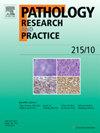卵巢癌中的 PARP 抑制剂:机制、抗药性和联合疗法的前景。
IF 2.9
4区 医学
Q2 PATHOLOGY
引用次数: 0
摘要
目前治疗卵巢癌的方法主要集中在手术切除和使用铂类药物的化疗上,同时正在研究免疫疗法等新方法,以提高治疗效果。卵巢癌的治疗因其晚期发现、肿瘤多样性和治疗选择有限等挑战而变得复杂。因此,精准医疗和 PARPi(聚 ADP-核糖聚合酶抑制剂)等靶向疗法等创新策略越来越有必要。文章强调了以 PARPi 为重点的创新治疗方法在革新卵巢癌治疗和改善患者预后方面的重要意义。文章介绍了 PARP 的基本知识、结构及其在 DNA 修复中的功能。它进一步强调了抑制 PARP 如何有助于治疗卵巢癌。它阐述了 PARPi 的作用机制。它涵盖了有关 PARPi 的临床试验以及与 PARPi 联合使用的药物。它提到了 PARPi 如何产生耐药性以及克服耐药性的策略。本文章由计算机程序翻译,如有差异,请以英文原文为准。
PARP inhibitors in ovarian cancer: Mechanisms, resistance, and the promise of combination therapy
Current approaches to treating ovarian cancer focus mainly on surgical cytoreduction and chemotherapy using platinum-based drugs, while newer methods such as immunotherapy are being investigated to enhance treatment outcomes. Treating ovarian cancer is complicated by challenges such as late-stage detection, tumor diversity, and limited treatment choices. Therefore, innovative strategies such as precision medicine and targeted therapies like PARPi (Poly ADP-Ribose Polymerase inhibitors) are increasingly necessary. The article highlights the significance of an innovative therapeutic approach focusing on PARPi in revolutionizing ovarian cancer treatment and improving patient outcomes. It covers the basic knowledge of PARP, its structure, and its function in DNA repair. It further emphasizes how inhibiting PARP can help in treating ovarian cancer. It elaborates on the mechanism of action of PARPi. It covers the clinical trials governing PARPi and the combination of drugs used with PARPi. It mentions how the resistance is developed to PARPi and the strategies to overcome the resistance developed.
求助全文
通过发布文献求助,成功后即可免费获取论文全文。
去求助
来源期刊
CiteScore
5.00
自引率
3.60%
发文量
405
审稿时长
24 days
期刊介绍:
Pathology, Research and Practice provides accessible coverage of the most recent developments across the entire field of pathology: Reviews focus on recent progress in pathology, while Comments look at interesting current problems and at hypotheses for future developments in pathology. Original Papers present novel findings on all aspects of general, anatomic and molecular pathology. Rapid Communications inform readers on preliminary findings that may be relevant for further studies and need to be communicated quickly. Teaching Cases look at new aspects or special diagnostic problems of diseases and at case reports relevant for the pathologist''s practice.

 求助内容:
求助内容: 应助结果提醒方式:
应助结果提醒方式:


